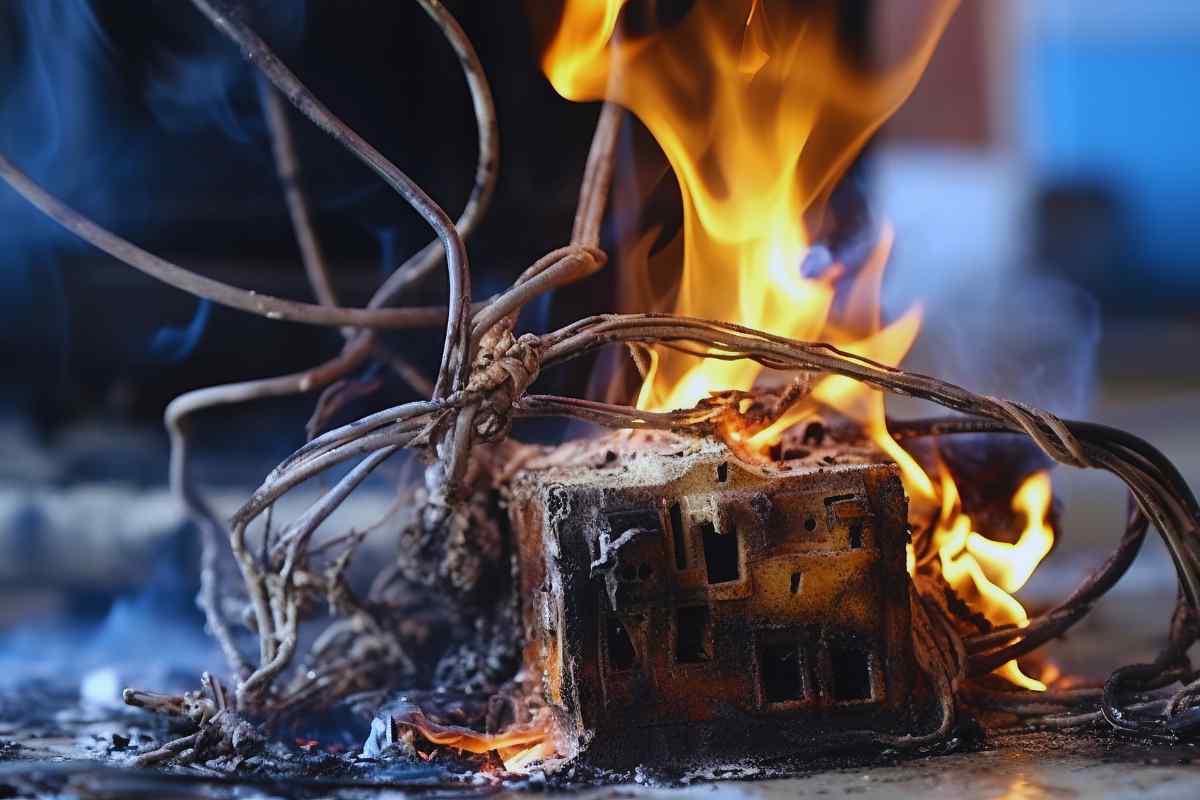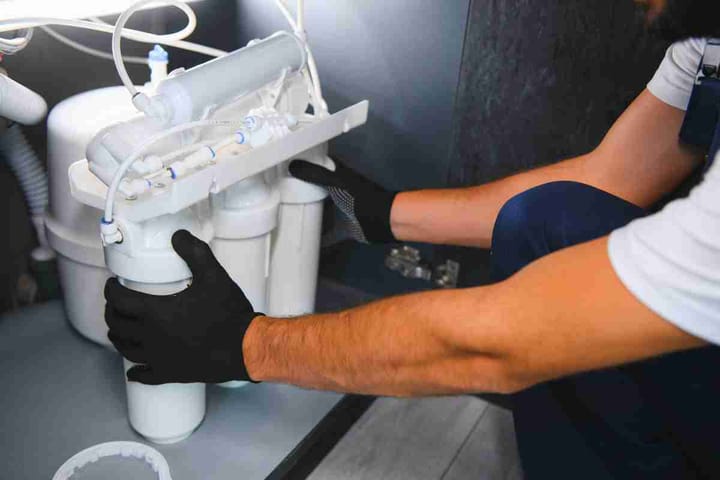How to Prevent Your AC from Catching Fire Amid Extreme Heatwaves
Extreme heat puts a strain on your AC, but don't let it become a fire hazard! Learn how to keep your AC running safely and efficiently during a heatwave.

As global temperatures continue to rise, heatwaves are becoming more frequent and intense. Air conditioners (ACs) become our lifesavers during these relentless heat waves. However, the intense strain on your AC unit during this time can also pose a fire risk.
This article equips you with the knowledge to keep your cool (literally) and prevent your AC from catching fire during a heatwave. We'll delve into the reasons behind AC fires, the warning signs to watch out for, and most importantly, practical steps you can take to ensure your AC unit functions safely and efficiently throughout the hottest days.
Why Does My AC Unit Pose a Fire Risk During a Heatwave?
Several factors contribute to an increased fire risk for AC units during extreme heat:
- Overworked System: Heatwaves force your AC to work much harder than usual. This continuous strain can lead to overheating of electrical components, potentially causing a fire.
- Blocked Airflow: Debris-like leaves, twigs, and dust can accumulate around the outdoor unit, hindering proper airflow. Reduced airflow can significantly increase internal temperatures, putting stress on the system.
- Electrical Issues: Fluctuating voltage or faulty wiring can cause electrical components to overheat and spark, igniting nearby flammable materials.
- Low Refrigerant Levels: Low refrigerant levels reduce the unit's ability to cool effectively. The compressor then works extra hard, increasing the risk of overheating.
Warning Signs That Your AC Unit Needs Attention
Being vigilant about your AC's health is crucial during a heatwave. Here are some signs that indicate potential trouble:
- Burning Smell: A pungent burning odor emanating from the unit is a major red flag. Shut off the AC immediately and contact a qualified technician.
- Unusual Noises: Loud grinding, screeching, or rattling noises could indicate internal component wear and tear, increasing the risk of overheating.
- Warm Airflow: If cool air isn't coming out despite the AC being on, it signifies insufficient cooling, potentially due to low refrigerant or blocked airflow.
- Frequent Tripping of Circuit Breakers: Regular tripping of the circuit breaker supplying power to the AC suggests electrical issues that need immediate attention.
- Visible Damage: Check the outdoor unit for signs of physical damage like burn marks, loose wires, or corrosion on electrical components.
Regular Maintenance and Inspection
Regular maintenance is the cornerstone of preventing AC fires. Here’s a step-by-step process to ensure your AC remains in optimal condition:
1. Schedule Professional Inspections
- Frequency: At least once a year, preferably before the summer season.
- Tasks: Inspect electrical connections, refrigerant levels, and overall unit condition.
- Benefits: Early detection of potential issues like frayed wires or refrigerant leaks.
2. Clean or Replace Filters
- Frequency: Monthly during peak usage periods.
- Process: Remove the filter, clean it with water and mild detergent, or replace it if it’s disposable.
- Benefits: Improved airflow, reduced strain on the system, and lower risk of overheating.
3. Clear the Condenser Coils
- Frequency: Every 6 months.
- Process: Turn off the power, remove debris with a brush or vacuum, and clean the coils with a coil cleaner.
- Benefits: Enhanced efficiency and reduced risk of the unit overheating.
Ensure Proper Installation
Proper installation is critical for the safe operation of your AC. Here are some key considerations:
1. Hire Certified Professionals
- Why: Professional installation ensures adherence to safety standards and correct setup.
- Tasks: Ensure the unit is properly grounded and connected to a dedicated circuit.
2. Check for Adequate Ventilation
- Why: Proper ventilation prevents the unit from overheating.
- Tasks: Ensure the outdoor unit has at least 2 feet of clearance on all sides and is not obstructed by plants or other objects.
3. Use the Right Size Unit
- Why: An undersized unit will overwork, while an oversized unit will cycle on and off frequently, both leading to increased fire risk.
- Tasks: Calculate the appropriate size based on room dimensions and heat load.
Monitor Electrical Systems
Electrical issues are a primary cause of AC-related fires. Here’s how to ensure your electrical system is safe:
1. Upgrade Electrical Wiring
- When: If your home has old or aluminum wiring.
- Why: Modern copper wiring is safer and more efficient.
- Tasks: Hire an electrician to inspect and, if necessary, upgrade the wiring.
2. Install Circuit Breakers
- Why: Circuit breakers protect against overloads and short circuits.
- Tasks: Ensure your AC is connected to a dedicated circuit breaker and test it regularly.
3. Use Surge Protectors
- Why: Surge protectors prevent damage from power surges, which can cause fires.
- Tasks: Install a surge protector for the AC and consider whole-house surge protection.
Improve Home Insulation and Ventilation
Good insulation and ventilation reduce the strain on your AC, lowering fire risk. Here’s what to do:
1. Insulate Your Home
- Why: Insulation keeps your home cool, reducing the need for constant AC use.
- Tasks: Insulate walls, attics, and windows using materials like foam or fiberglass.
2. Enhance Natural Ventilation
- Why: Proper ventilation helps maintain a cool indoor environment.
- Tasks: Use ceiling fans, open windows during cooler parts of the day, and ensure vents are unblocked.
Adopt Safe Usage Practices
Proper usage can significantly reduce the risk of your AC catching fire. Follow these tips:
1. Avoid Overuse
- Why: Continuous operation can cause the unit to overheat.
- Tasks: Use a programmable thermostat to maintain a consistent temperature and give the AC periodic breaks.
2. Do Not Ignore Warning Signs
- Why: Strange noises, burning smells, or reduced cooling efficiency can indicate serious problems.
- Tasks: Turn off the AC immediately and call a professional if you notice any unusual signs.
3. Keep Flammable Materials Away
- Why: Flammable materials can easily catch fire from overheating units.
- Tasks: Ensure the area around the indoor and outdoor units is free from papers, curtains, and other flammable items.
Emergency Preparedness
Despite all precautions, emergencies can still happen. Being prepared can mitigate damage and ensure safety:
1. Install Smoke Detectors
- Why: Early detection of smoke can prevent a fire from spreading.
- Tasks: Install smoke detectors in key areas, including near the AC unit, and test them regularly.
2. Keep a Fire Extinguisher Handy
- Why: A fire extinguisher can quickly douse small fires before they spread.
- Tasks: Place a fire extinguisher in an easily accessible location and ensure all family members know how to use it.
3. Develop an Emergency Plan
- Why: A well-thought-out plan ensures quick and safe evacuation.
- Tasks: Create an emergency evacuation plan, conduct regular drills, and ensure everyone knows the escape routes.
Additional Tips for a Cooler and Safer Home During the Heatwave
- Embrace Natural Ventilation: Open windows and doors in the evening when the outside air is cooler. This allows hot air to escape and promotes natural air circulation.
- Utilize Ceiling Fans: Ceiling fans create a wind chill effect, making you feel cooler without putting additional strain on your AC.
- Invest in a Programmable Thermostat: Program your thermostat to adjust the temperature automatically throughout the day, keeping it cooler at night and slightly warmer during peak heat hours.
- Stay Hydrated: Drinking plenty of water helps regulate your body temperature and reduces the need for extreme cooling.
- Plan Outdoor Activities Strategically: Schedule strenuous activities for cooler mornings or evenings to avoid adding heat to your body during the hottest part of the day.
Conclusion
By following these preventative measures and staying informed about your AC unit's health, you can ensure it functions safely and efficiently throughout the heatwave. Remember, a well-maintained AC not only keeps you cool but also minimizes the risk of fire hazards, giving you peace of mind during the scorching summer months.




Comments ()